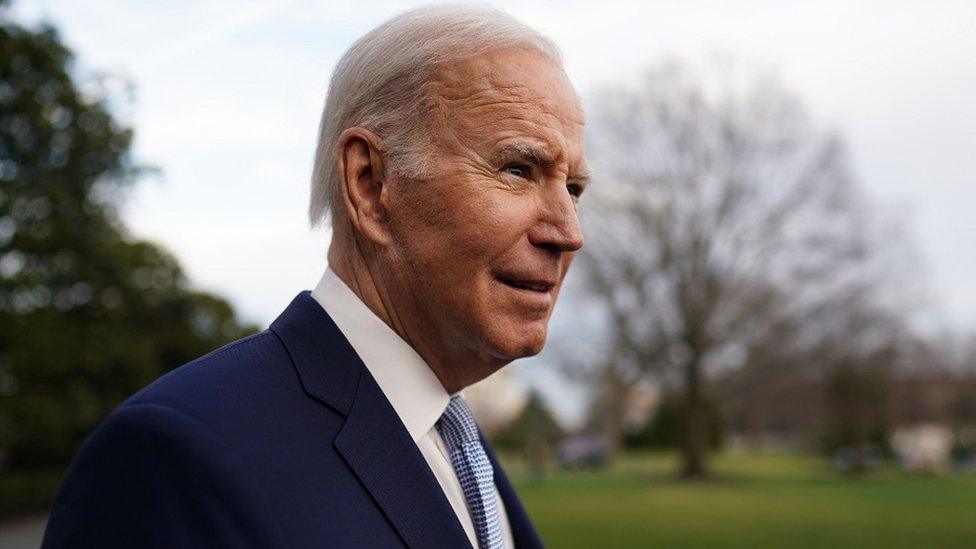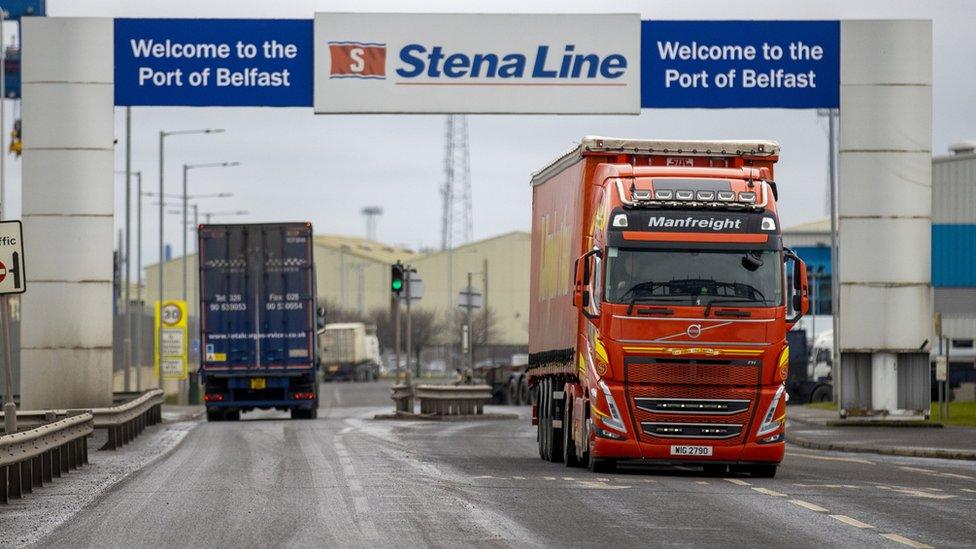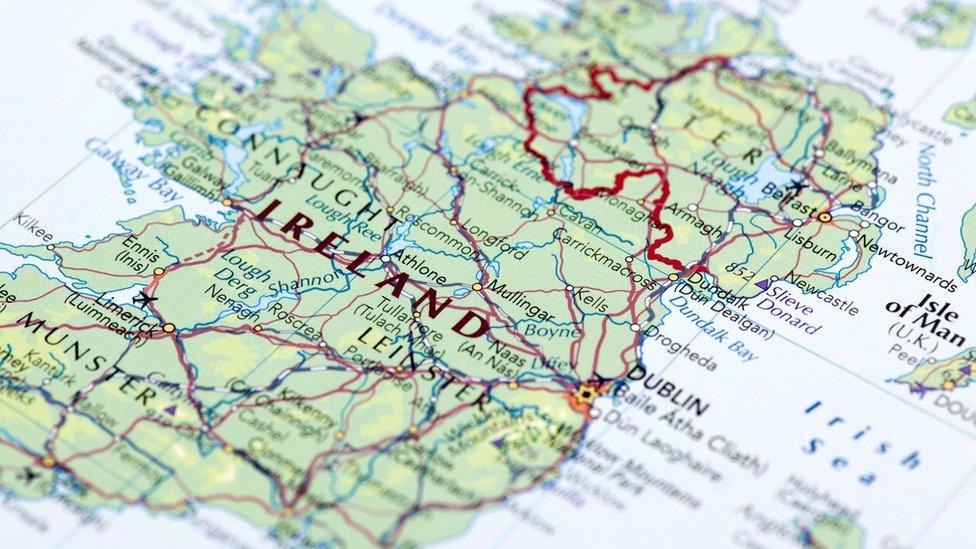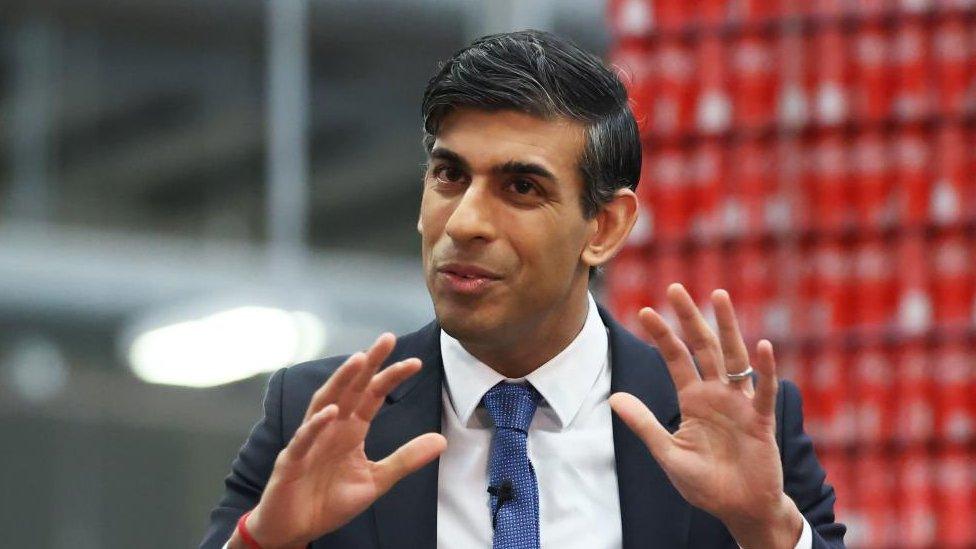Windsor Framework: New Brexit deal about people of Northern Ireland, says Sunak
- Published
PM Rishi Sunak: "There won't be routine checks for goods moving GB to NI"
The new Brexit deal agreed with the EU is about "what is best for people in Northern Ireland" and not politicians, Rishi Sunak has said.
The prime minister announced the deal, which aims to fix post-Brexit problems in Northern Ireland, on Monday.
Speaking on BBC Radio 4's Today programme, Mr Sunak said the deal "will make a positive difference for all" in Northern Ireland.
"This is not about me or any one political party," he said.
The Windsor Framework agreed with the EU restores "balance" to Northern Ireland's politics, which is at the heart of the Good Friday peace agreement, Mr Sunak said.
Political parties in Northern Ireland will need "the time and the space to consider the detail" of the deal, Mr Sunak said.
But he added he was "confident" that Stormont parties will "recognise that this a good deal and that will enable them to get back into a power-sharing executive".
The Northern Ireland Assembly has been suspended since February 2022 after the Democratic Unionist Party (DUP) walked out of Stormont's power-sharing agreement.
The DUP objected to the Northern Ireland Protocol creating an effective trade border across the Irish Sea from Great Britain.
Imposing plans
During his interview, Mr Sunak avoided answering whether the deal would be implemented without DUP support.
The BBC's Martha Kearney asked: "If [the DUP] were still worried about sovereignty and they decide that they do not want to go back into power-sharing, will the framework go ahead anyway?"
Mr Sunak said: "The framework is what we have agreed with the European Union.
"It is an incredibly positive and comprehensive agreement and ensures we have smooth and flowing trade within the UK internal market and protects Northern Ireland.
"This is not necessarily about me, or any one political party. This is about what is best for the people and communities and businesses of Northern Ireland and this agreement will make a hugely positive difference to them."
Speaking to an audience in Belfast later on Tuesday, Mr Sunak said the fact that Northern Ireland was able to have open access to the EU and unhindered trade with the UK's home market was "an unbelievably special position" unavailable to any other trading nation.
And he said if his deal was accepted, Northern Ireland would be in a "unique position in the entire world, European continent, in having privileged access not just to the UK home market, which is enormous, fifth biggest in the world, but also the European Union's single market. Nobody else has that."
Brake the deadlock
Alongside a series of trade rule changes, the deal includes what's being called a Stormont brake - a mechanism allowing Northern Ireland Assembly Members to raise an objection and potentially stop a new EU rule applying in Northern Ireland.
But the brake can also only be used when the Northern Ireland Executive is fully functioning - creating an incentive for all parties to go back into government.
The key decision is whether the DUP decide to sign up to Mr Sunak's new deal, easing the way for Stormont to return.
DUP's leader Sir Jeffrey Donaldson said the Windsor Framework went "some way" to addressing his party's concerns, but some issues remained.
The DUP will take time to come to a "collective decision" on the new deal, he said.
"We only received it yesterday afternoon so we'll study it and take a conclusion on it as a whole," Sir Jeffrey added.
No deadline
On Monday, Sinn Féin, which is the largest party in the Northern Ireland Assembly, welcomed the deal, although it said it still needed to examine the details.
Sinn Fein president Mary Lou McDonald said there was no justification for the DUP "to keep the Executive down".
"The onus is now very much on the DUP to join with everyone else in making politics work," she said.
The government has not set a deadline for a response to the deal, and the prime minister's spokesman said Mr Sunak understood parties would want to take time to consider it.
Negotiations over the deal took many months, and talks continued down to the wire, the BBC's political correspondent Jonathan Blake says. Changes were made to the text even in the hours before Mr Sunak and EU chief Ursula Von der Leyen shook hands for the cameras.
"On the day the deal was done some of us went to bed at 2 or 3am. People who have been saying this deal was done two weeks ago should speak to my wife. It's not been sitting there finished," one official said.

President Joe Biden said he hoped "Northern Ireland's political institutions are soon back up and running".
Gaining support from Conservative MPs is also key for Mr Sunak, who is meeting the 1922 Committee of backbench Tory MPs in Westminster, in an effort to convince them to support the deal ahead of an expected vote next week.
Several prominent Brexiters have backed the deal, including former Brexit secretary David Davis and former international trade secretary Liam Fox.
Mr Davis called the framework a "spectacular negotiating success".
US President Joe Biden said the deal was "an essential step to ensuring that the hard-earned peace and progress of the Belfast/Good Friday Agreement is preserved and strengthened".
In a statement,, external Mr Biden said: "I am confident the people and businesses of Northern Ireland will be able to take full advantage of the economic opportunities created by this stability and certainty."
Boris Johnson, who established the Northern Ireland Protocol, has yet to make a public statement. Mr Sunak indicated he had discussed the deal with the former PM.
The European Research Group (ERG), made of up pro-Brexit Conservatives, will meet on Tuesday evening to scrutinise the deal before deciding whether to back it.
Mark Francois, chair of the ERG, also said he hoped "we won't find any nasty surprises which would materially undermine the position of Northern Ireland".
- Published27 February 2023

- Published28 February 2023

- Published28 February 2023
